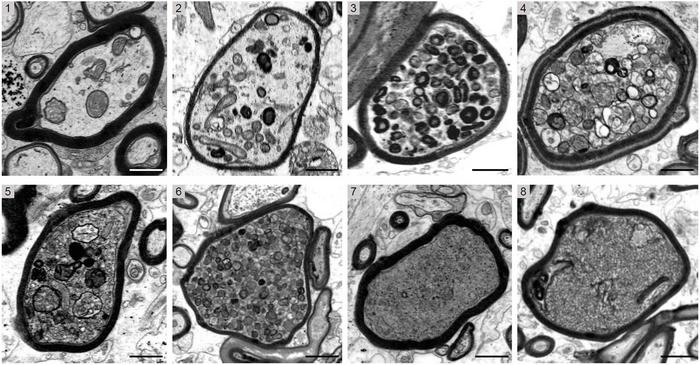Multiple sclerosis (MS) is a serious neurological disease that usually causes permanent disability. Approximately 2.9 million people are affected worldwide, 240,000 in Germany alone. The exact cause of the disease is not yet clear, but a central feature is a loss of the insulating protective layer of axons – the neuronal connections in the central nervous system – which is triggered by autoimmune processes. The coating of the axons, known as myelin, is formed by highly specialised glial cells (i.e. oligodendrocytes) and enables the rapid transmission of electrical nerve impulses. To date, it has been assumed that in MS oligodendrocytes and myelin are degraded by immune cells and that the then vulnerable axons suffer irreversible damage as a result of further local inflammatory processes. The loss of axons plays a decisive role in the severity of MS in patients and in the course of the disease.

Credit: Photo: Leipzig University
Multiple sclerosis (MS) is a serious neurological disease that usually causes permanent disability. Approximately 2.9 million people are affected worldwide, 240,000 in Germany alone. The exact cause of the disease is not yet clear, but a central feature is a loss of the insulating protective layer of axons – the neuronal connections in the central nervous system – which is triggered by autoimmune processes. The coating of the axons, known as myelin, is formed by highly specialised glial cells (i.e. oligodendrocytes) and enables the rapid transmission of electrical nerve impulses. To date, it has been assumed that in MS oligodendrocytes and myelin are degraded by immune cells and that the then vulnerable axons suffer irreversible damage as a result of further local inflammatory processes. The loss of axons plays a decisive role in the severity of MS in patients and in the course of the disease.
Recent research conducted by a team of scientists from Leipzig University and Max Planck Institute for Multidisciplinary Sciences in Göttingen suggests that the understanding of the disease now needs to change. In the current study, the research groups were able to show that myelin, which was previously viewed as a solely protective structure, can actually threaten the survival of the axons. This is the case, for example, when myelin sheaths have been attacked by immune cells, but continue to surround the axons and thus isolate them from the environment. Oligodendrocytes are not only responsible for the formation of myelin. They also perform important functions that support the energy metabolism of the axons. Myelinated axons, in particular, are highly dependent on metabolic support because they have little access to nutrients on their own. Support of myelinated axons through a myelin sheath requires that the architecture of myelin be intact, including the tight communication channels between the oligodendrocytes and axons.
“When oligodendrocytes are exposed to an acute inflammatory environment, they may lose their ability to support the axons, and myelin becomes a threat to the survival of the axons,” says Professor Klaus-Armin Nave from the Max Planck Institute for Multidisciplinary Sciences in Göttingen, Germany, describing the team’s research hypothesis that was formulated at the outset. To test their hypothesis, the researchers examined tissue samples from patients with multiple sclerosis, as well as various mouse models of this disease in order to experimentally simulate the autoimmune attack on myelin. For the first time, the researchers were able to demonstrate by electron microscopy in the tissue samples of the patients that irreversible damage almost always occurs in the axons that are still coated with myelin (see figure). Conversely, using genetically modified mouse models, the researchers were able to show that “naked” axons in an acute inflammatory region of the central nervous system are better protected from degeneration.
“By challenging the prevailing image of myelin as a solely protective structure, we can gain a deeper understanding of the disease and potentially develop new treatment strategies that will maintain the functionality of the axons,” explains Professor Ruth Stassart from the Paul Flechsig Institute – Center for Neuropathology and Brain Research, Institute of Neuropathology at Leipzig University Hospital. “Instead of preserving the damaged myelin, it might actually be therapeutically better to promote rapid degradation of damaged myelin and support the regeneration of functional myelin,” adds Dr. Robert Fledrich, a researcher in the Institute of Anatomy at Leipzig University.
Original publication in Nature Neuroscience: Myelin insulation as a risk factor for axonal degeneration in autoimmune demyelinating disease. DOI: 10.1038/s41593-023-01366-9
Journal
Nature Neuroscience
DOI
10.1038/s41593-023-01366-9
Method of Research
Experimental study
Article Title
Myelin insulation as a risk factor for axonal degeneration in autoimmune demyelinating disease
Article Publication Date
29-Jun-2023




